Sports Nutrition Market Research, 2032
The global sports nutrition market size was valued at $43.7 billion in 2023, and is projected to reach $78.3 billion by 2032, growing at a CAGR of 6.7% from 2023 to 2032.
Sports nutrition products are specialized nutrition products that are designed to boost performance and increase recovery speed during and after sports activities. These products are made with ingredients that are useful for the body and help provide the body with proteins, nutrients, minerals, and amino acids that help increase the efficiency of physical activities and provide better results. The most commonly used forms of sports nutrition products are protein powders and sports drinks, however, other supplements like RTD protein drinks, energy bars, sports supplements, and ISO drinks powder are also widely used by consumers.
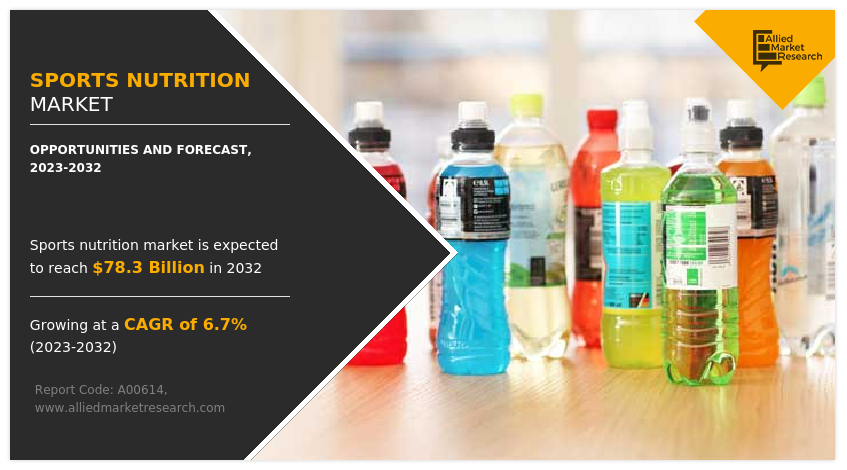
Market Dynamics
The sports nutrition market is experiencing significant growth due to the evolving preferences of consumers seeking healthier and tailored nutritional options. There is a notable shift towards products that not only support athletic performance but also align with specific dietary preferences and wellness goals as individuals become increasingly health-conscious. Consumers are actively seeking sports nutrition products that offer cleaner ingredient profiles, transparency in labeling, and a focus on natural or plant-based ingredients. Moreover, the convenience factor plays a crucial role in shaping consumer preferences, with increase in demand for easily consumable and on-the-go sports nutrition options. The emphasis on personalization, diverse dietary choices, and convenient consumption aligns with the evolving lifestyles and preferences of modern consumers, driving the sports nutrition market demand for sports nutrition products that not only deliver performance benefits but also resonate with individual health and wellness priorities.
The developments in the sports nutrition market growth are linked to the continuous innovation in product formulations. Ongoing research and development endeavors are resulting in the creation of fresh and enhanced sports nutrition offerings, capturing the attention of consumers, and driving market expansion. Formulations featuring state-of-the-art ingredients, sophisticated delivery systems, and scientifically-supported components are gaining favor among athletes and fitness enthusiasts alike. Innovation not only improves the effectiveness of sports nutrition products but also broadens the array of choices accessible to consumers. Inventive products are reshaping the market landscape whether it involves introducing new flavor profiles, enhancing the absorption of nutrients, or crafting specialized formulations for specific performance objectives. The dynamic character of the sports nutrition sector, marked by a commitment to staying abreast of nutritional advancements, attracts consumers in search of products that not only fulfill their performance requirements but also align with the latest breakthroughs in nutritional science. This emphasis on innovation stands as a pivotal force propelling sustained growth in the sports nutrition market.
The escalating demand for sustainable and clean label products is a significant catalyst behind the growth in the sports nutrition market. Desire for transparency in product ingredients have led to a rise in preference for sports nutrition options that align with sustainability practices and feature clean labels. This shift is prompting manufacturers to develop products that not only deliver on performance but also meet ethical and ecological considerations. Consumers are now seeking sports nutrition products that use responsibly sourced ingredients, prioritize environment-friendly packaging, and adhere to clean label standards. This emphasis on sustainability resonates with a growing segment of environment-conscious consumers, thereby driving the demand for sports nutrition options that reflect a commitment to both personal health and environmental well-being. As a result, the market is adapting to incorporate eco-friendly practices, with sustainability becoming a crucial factor influencing purchasing decisions in the evolving landscape of health and wellness products.
However, the growth of the sports nutrition market faces a hindrance due to the perceived need for specialization. Some consumers may view sports nutrition products as applicable only to elite athletes or serious fitness enthusiasts, limiting the market's potential among the broader population. This perception creates a barrier to entry for individuals who may benefit from these products but do not consider themselves part of the targeted demographic. Addressing the restraint of perceived specialization requires targeted marketing and educational efforts to broaden the understanding of sports nutrition's applicability. Highlighting the diverse benefits, including general health and fitness support, could help dispel the notion that these products are exclusively for a niche audience. The industry can work to overcome this restraint and tap into a larger consumer base, by shifting perceptions and emphasizing the inclusivity of sports nutrition, thereby fostering sustained market growth.
Segmental Overview
The sports nutrition market forecast is segmented on the basis of type, end user, sales channel, and region. By type, the market is segregated into protein powder, ISO drink powder, sports supplements, RTD protein drinks, sports drinks, energy bars, and others. By end user, the market is divided into athletes, bodybuilders, and lifestyle users. By sales channel, the market is studied across hypermarket/supermarket, drugs and specialty stores, fitness centers, and online channels. By region, the sports nutrition industry is studied across North America, Europe, Asia-Pacific, and LAMEA.
By Type
By type, the global market is segmented into protein powder, ISO drink powder, sports supplements, RTD protein drinks, sports drinks, energy bars, and others. The protein powder segment accounted for a major sports nutrition market share in 2022 and is expected to grow at a significant CAGR during the forecast period. Protein powder commands a significant share in the market primarily due to its adaptability and ease of use. Serving as a convenient and efficient source of high-quality protein, crucial for muscle recovery and development, it has become a keystone for athletes and fitness enthusiasts. The quick absorption of protein powder facilitates rapid post-workout recovery.
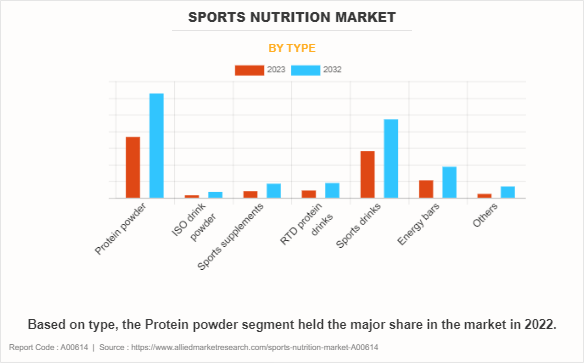
By End User
By end user, the market is segmented into athletes, bodybuilders, and lifestyle users. The athletes segment accounted for a major market share in 2022 and is expected to grow at a significant CAGR during the forecast period. The athletes segment commands a significant share in the sports nutrition market due to the unique and increased nutritional demands of individuals engaged in intense physical activities. Athletes require specialized nutrition to support muscle development, enhance performance, and expedite recovery after strenuous workouts. Sports nutrition products cater specifically to these needs, offering optimized formulations with precise ratios of macronutrients and essential vitamins. The increasing awareness among athletes about the role of nutrition in achieving peak performance further fuels the dominance of the athlete's segment in the market.
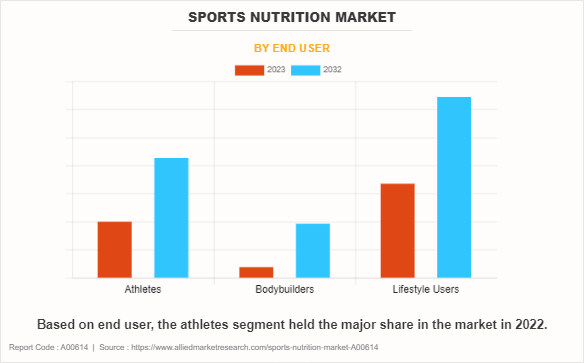
By Sales Channel
By sales channel, the global market is studied across hypermarket/supermarket, drugs and specialty stores, fitness centers, and online channels. The hypermarket/supermarket segment accounted for a major market share in 2022 and is expected to grow at a significant CAGR during the forecast period. The hypermarkets/supermarkets segment dominates the sports nutrition market due to its widespread accessibility and consumer convenience. These retail outlets provide a one-stop shopping experience, offering a diverse range of sports nutrition products under a single roof. Consumers often prefer the convenience of purchasing supplements alongside their regular groceries. Additionally, the extensive shelf space in hypermarkets and supermarkets allows for a wide variety of brands and products, attracting a broad customer base. The prominence of these retail channels enhances product visibility and contributes to the major share held by the hypermarkets/supermarkets segment in the market.
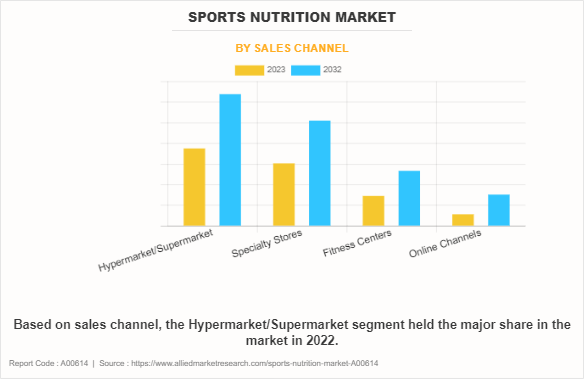
By Region
By region, the sports nutrition market is studied across North America, Europe, Asia-Pacific, and LAMEA. The North America region accounted for a major market share in 2022 and is expected to grow at a significant CAGR during the forecast period. North America commands a significant share in the market due to a combination of factors. The region has a well-established fitness culture, with a high prevalence of health-conscious consumers actively seeking nutritional supplements. Robust marketing strategies, widespread product availability, and a strong emphasis on sports and fitness contribute to the market's growth. Additionally, an increasing awareness of the importance of active lifestyles and a higher disposable income further drives demand. The presence of key market players and continuous innovation in product formulations solidify North America's dominant position in the market.
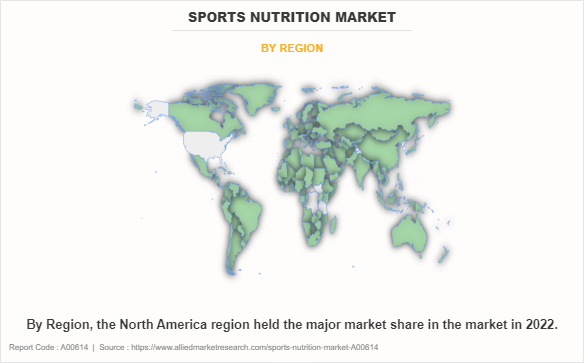
Competitive Landscape
The major players operating in the market focus on key market strategies, such as mergers, product launches, acquisitions, collaborations, and partnerships. They also focus on strengthening their market reach to maintain their reputation in the ever-competitive market. Some of the major players profiled for in the sports nutrition market analysis include Abbott Nutrition, Inc., Clif Bar & Company, Glanbia Plc., GNC Holdings, Otsuka Pharmaceutical Co., Ltd., PepsiCo Inc., Post Holdings, Inc., Reckitt Benckiser Group Plc., The Coca-Cola Company, Yakult Honsha Co., Ltd.
Key Benefits for Stakeholders
- This report provides a quantitative analysis of the market segments, current trends, estimations, and dynamics of the market analysis from 2023 to 2032 to identify the prevailing sports nutrition market opportunities.
- The market research is offered along with information related to key drivers, restraints, and opportunities.
- Porter's five forces analysis highlights the potency of buyers and suppliers to enable stakeholders make profit-oriented business decisions and strengthen their supplier-buyer network.
- In-depth analysis of the sports nutrition market segmentation assists to determine the prevailing market opportunities.
- Major countries in each region are mapped according to their revenue contribution to the global market.
- Market player positioning facilitates benchmarking and provides a clear understanding of the present position of the market players.
- The report includes the analysis of the regional as well as global sports nutrition market trends, key players, market segments, application areas, and market growth strategies.
Sports Nutrition Market Report Highlights
| Aspects | Details |
| Market Size By 2032 | USD 78.3 billion |
| Growth Rate | CAGR of 6.7% |
| Forecast period | 2023 - 2032 |
| Report Pages | 473 |
| By Type |
|
| By End user |
|
| By Sales Channel |
|
| By Region |
|
| Key Market Players | Yakult Honsha Co., Ltd., The Coca-Cola Company, Abbott Laboratories, CLIF BAR & COMPANY, GNC Holdings, LLC, Reckitt Benckiser Group plc., Glanbia PLC, Post Holdings, Inc., Otsuka Holdings Co., Ltd., PepsiCo, Inc. |
| Other players in the value chain include | Atlantic Multipower UK Limited, GlaxoSmithKline PLC, Olimp Laboratories, Ultimate Nutrition Inc., PowerBar Europe GmbH |
Analyst Review
According to the insights of the CXOs, the global sports nutrition market is expected to witness robust growth during the forecast period. The sports nutrition market is experiencing significant growth due to the evolving preferences of consumers seeking healthier and tailored nutritional options. There is a notable shift towards products that not only support athletic performance but also align with specific dietary preferences and wellness goals as individuals become increasingly health-conscious. Consumers are actively seeking sports nutrition products that offer cleaner ingredient profiles, transparency in labeling, and a focus on natural or plant-based ingredients.
However, the growth of the sports nutrition market faces a notable restraint in the form of taste and palatability challenges. Despite the functional benefits offered by these products, some formulations, especially those rich in proteins, may encounter difficulties in meeting consumer taste preferences.
The global sports nutrition market size was valued at USD 43.7 billion in 2023, and is projected to reach USD 78.3 billion by 2032
The global sports nutrition market is projected to grow at a compound annual growth rate of 6.7% from 2023-2032 to reach USD 78.3 billion by 2032
The key players profiled in the reports includes Abbott Nutrition, Inc., Clif Bar & Company, Glanbia Plc., GNC Holdings, Otsuka Pharmaceutical Co., Ltd., PepsiCo Inc., Post Holdings, Inc., Reckitt Benckiser Group Plc., The Coca-Cola Company, Yakult Honsha Co., Ltd.
North America dominated in 2023 and is projected to maintain its leading position throughout the forecast period.
Evolving Consumer Preferences, Innovation in Product Formulations, Sustainability and Clean Labels, and Global Health Trends majorly contribute toward the growth of the market.
Loading Table Of Content...
Loading Research Methodology...



